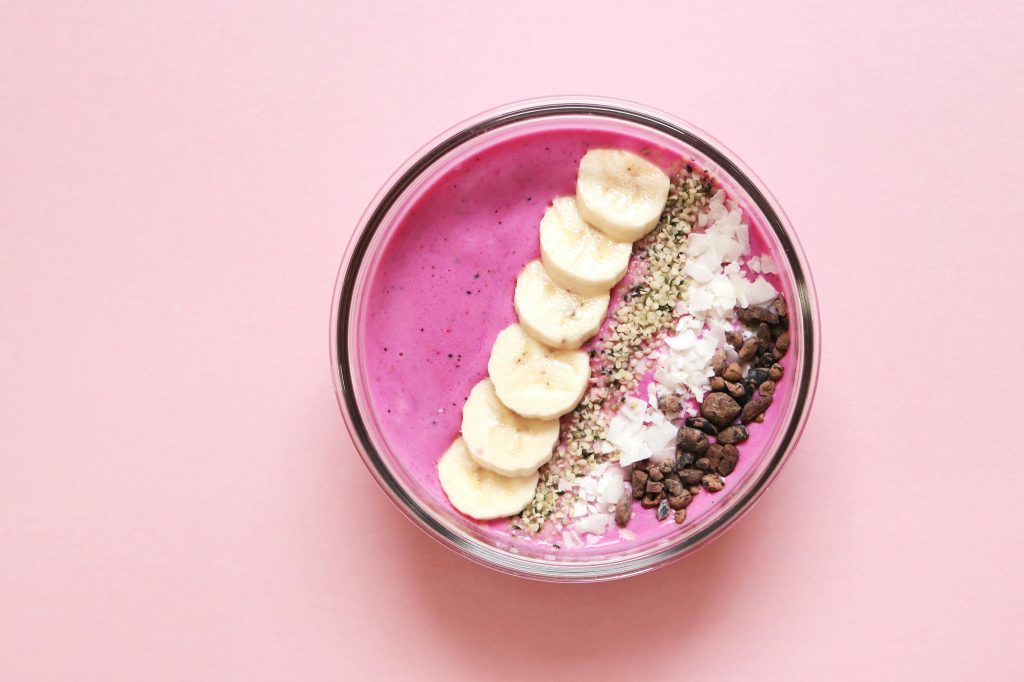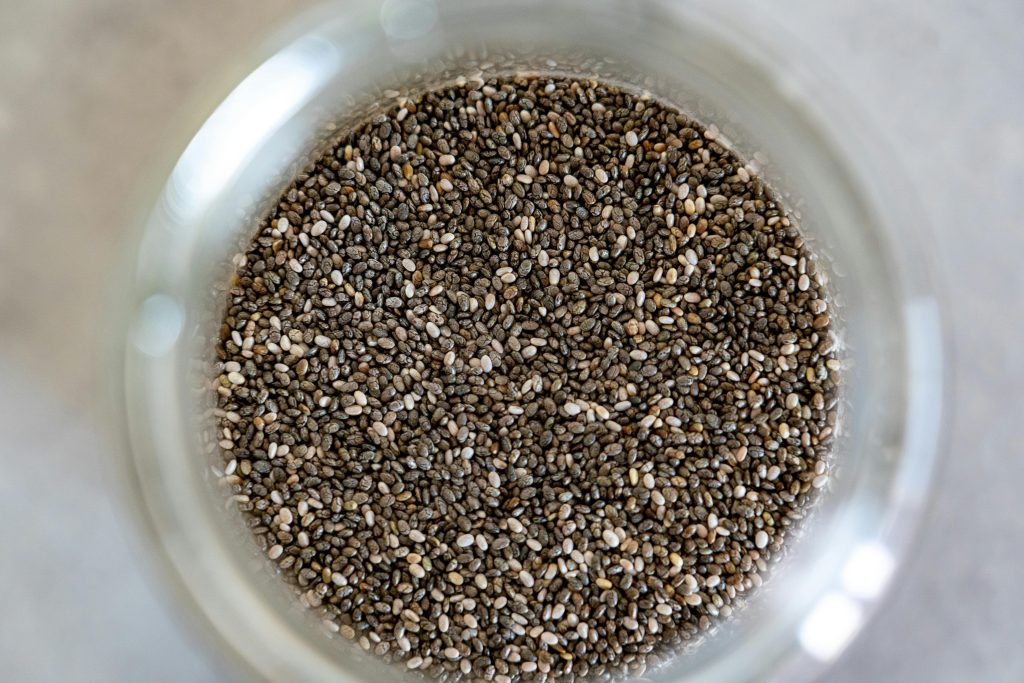Small in Size, Big on Nutrition
Chia seeds have become a popular superfood in recent years, and for good reason. These tiny, nutrient-dense seeds are packed with a variety of health benefits, making them an easy addition to any diet. While chia seeds have been consumed for centuries, recent research has brought their health benefits into the spotlight. From supporting heart health to boosting digestion, increasing energy and reducing inflammation, chia seeds are truly a “superfood” with evidence based benefits offering a natural and versatile way to support your wellbeing.

1. Rich in Omega-3 Fatty Acids
Chia seeds are one of the best plant based sources of omega-3 fatty acids, particularly alpha-linolenic acid (ALA). Omega-3s are essential fats that play a crucial role in reducing inflammation and supporting brain health. While fish is commonly touted as the best source of omega-3s, chia seeds offer a plant based alternative for those following a whole food plant based, vegetarian or vegan lifestyle. A study published in the Journal of Nutritional Biochemistry (2010) highlights the importance of ALA in reducing inflammation and improving heart health (Le & Young, 2010).
Incorporating chia seeds into your meals may help ensure that you’re getting sufficient omega-3s for supporting improved heart and brain health. Omega-3s are known to improve heart health by reducing triglyceride levels, lowering blood pressure, and decreasing the risk of heart disease (Gómez-Pinilla, 2008). By adding chia seeds to your diet, you can easily boost your omega-3 intake to help ensure you are getting sufficient omega-3s.
2. Packed with Fibre for Digestive Health
Chia seeds are an excellent source of dietary fibre, containing about 11 grams of fibre per 28 grams. This makes them one of the most fiber-rich foods you can eat. Dietary fibre is essential for maintaining healthy digestion, preventing constipation by promoting regular bowel movements, and regulating blood sugar levels.
A study examined the role of chia seeds in improving bowel regularity. The research found that chia seeds can increase fibre intake and help promote regular bowel movements, thanks to their ability to absorb liquid and form a gel-like consistency. This property not only helps with digestion but also aids in controlling appetite, as the fibre expands in the stomach, creating a feeling of fullness and potentially preventing overeating (Slavin, 2013).
Fibre is essential for maintaining a healthy gut microbiome, as it supports the growth of beneficial gut bacteria and helps regulate bowel function. Chia seeds play a dual role in both digestive health and weight management.
3. Heart Health
In addition to being rich in omega-3s, chia seeds are packed with antioxidants, fibre, and minerals like magnesium and potassium nutrients that contribute to heart health. Research has shown that antioxidants such as flavonoids and polyphenols, which are abundant in chia seeds, help neutralise free radicals, which are harmful compounds that can damage cells and contribute to chronic diseases like heart disease (Basu et al.,, 2013).
Furthermore, the fibre in chia seeds has been shown to help lower cholesterol levels and inflammation, and reduce the risk of high blood pressure. These effects, combined with the omega-3s, make chia seeds an excellent food for supporting your body with the nutrients it needs to maintain a healthy heart and prevent cardiovascular disease.

4. May Help with Weight Management
If you’re looking to maintain a healthy weight or lose a few pounds, chia seeds can be a helpful addition to your diet. The high fibre and protein content in chia seeds can help increase feelings of fullness and reduce hunger, which may lead to a decrease in overall calorie intake. Consuming chia seeds before meals can help reduce hunger and prevent overeating.
The fibre in chia seeds absorbs water and expands in your stomach, which can help curb your appetite and promote satiety. Additionally, chia seeds are a good source of plant based protein, which is essential for building muscle and supporting metabolism. Eating protein rich foods like chia seeds can also help to regulate blood sugar levels, preventing blood sugar spikes and crashes that can lead to overeating (Vuksan et al., 2009).
5. May Help Stabilise Blood Sugar Levels
Maintaining stable blood sugar levels is crucial for overall health, especially for those at risk of diabetes. Chia seeds may help with this by slowing the absorption of sugar into the bloodstream, thanks to their high fibre content. A study published in Diabetes Care found that chia seed supplementation resulted in a reduction of blood sugar spikes following meals. The fibre and omega-3s in chia seeds help slow down the absorption of carbohydrates, which can improve insulin sensitivity and promote stable blood sugar levels (Vulcan et al., 2009).
Several studies suggest that incorporating chia seeds into the diet may improve insulin sensitivity, which is important for controlling blood sugar levels and preventing type 2 diabetes (Nishi et al., 2009). Chia seeds’ ability to regulate blood sugar also makes them a great option for people with pre-diabetes or those looking to manage their blood sugar levels naturally.
6. Rich in Protein for Muscle Repair
Chia seeds are an excellent plant based source of protein, containing all nine essential amino acids. This makes them a complete protein, which is rare in the plant world. Protein is essential for building and repairing muscle tissue, especially after intense workouts or exercise.
The amino acids found in chia seeds are also important for the production of enzymes and hormones, as well as for supporting immune function. For athletes or anyone who is physically active, chia seeds can provide a convenient and nutritious protein boost.
7. Bone Health
Chia seeds are a great source of calcium, a mineral that’s crucial for maintaining strong bones and teeth. Just one ounce of chia seeds provides about 18% of your daily calcium needs. Calcium plays an important role in bone density and may help reduce the risk of osteoporosis as you age.
In addition to calcium, chia seeds are also rich in magnesium and phosphorus, two other minerals that are important for bone health. Magnesium, in particular, helps with the absorption of calcium and supports proper muscle and nerve function.
8. Antioxidant Powerhouse
Chia seeds are loaded with antioxidants, which help protect the body from oxidative stress and free radical damage. Free radicals are unstable molecules that can contribute to chronic diseases, including cancer and heart disease.
Antioxidants neutralise free radicals and protect cells from damage. The antioxidants in chia seeds—such as flavonoids and polyphenols—are also known to reduce inflammation, further contributing to their ability to support overall health (Basu et al., 2013).
How to Incorporate Chia Seeds Into Your Diet
One of the best things about chia seeds is their versatility. You can add them to almost any meal or snack, and they require no cooking. Here are a few simple ways to incorporate chia seeds into your diet:
Chia Pudding: Combine chia seeds with plant based milk and a sweetener of your choice (like date or maple syrup), then refrigerate for a few hours or overnight to create a creamy pudding. Top with fresh fruit, nuts, or granola.
Smoothies: Blend chia seeds into your favourite smoothie for an extra boost of fibre, protein, and omega-3s.
Baked Goods: Add chia seeds to muffins, cookies, or pancakes for a healthy crunch.
Salads and Granola: Sprinkle chia seeds over salads, plant based yoghurt, or granola for an added nutrient boost.
Chia Water: Mix chia seeds with water and let them sit for about 10 minutes until they form a gel-like consistency, then drink for a hydrating, energy boosting beverage.

Chia seeds may be small in size, but they are incredibly nutrient dense and offer a wide range of health benefits. From boosting heart health and stabilising blood sugar to supporting muscle repair and bone health, chia seeds are a powerful superfood that can easily be incorporated into your daily diet.
With their impressive nutritional profile and versatility, chia seeds are an excellent choice for anyone looking to improve their health naturally. Whether you’re an athlete, a busy professional, or simply someone looking to eat healthier, chia seeds are an easy and nutritious addition to any meal plan.
References
Basu, A., Rhone, M., & Rhone, E. (2013). Chia seeds: A novel source of alpha-linolenic acid and dietary fiber. Journal of the American College of Nutrition, 32(3), 159-163. https://doi.org/10.1080/07315724.2013.802537
Gómez-Pinilla, F. (2008). Brain foods: The effects of nutrients on brain function. Nature Reviews Neuroscience, 9(7), 568-578. https://doi.org/10.1038/nrn2421
Le, T. T., & Young, J. F. (2010). Alpha-linolenic acid (ALA) and its potential health benefits: A review. Journal of Nutritional Biochemistry, 21(10), 923-930. https://doi.org/10.1016/j.jnutbio.2010.02.004
Nishi, S. K., Yamaguchi, T., & Haruna, M. (2009). Effects of chia seed supplementation on blood glucose and insulin sensitivity in type 2 diabetes. Clinical Nutrition, 28(3), 242-248. https://doi.org/10.1016/j.clnu.2008.12.005
Slavin, J. L. (2013). Dietary fiber and body weight. Nutrition, 29(4), 381-388. https://doi.org/10.1016/j.nut.2012.07.007
Vuksan, V., Briston, C., & Jenkins, D. (2009). Effects of chia seed supplementation in type 2 diabetes mellitus. Diabetes Care, 32(5), 823-826. https://doi.org/10.2337/dc08-1636
